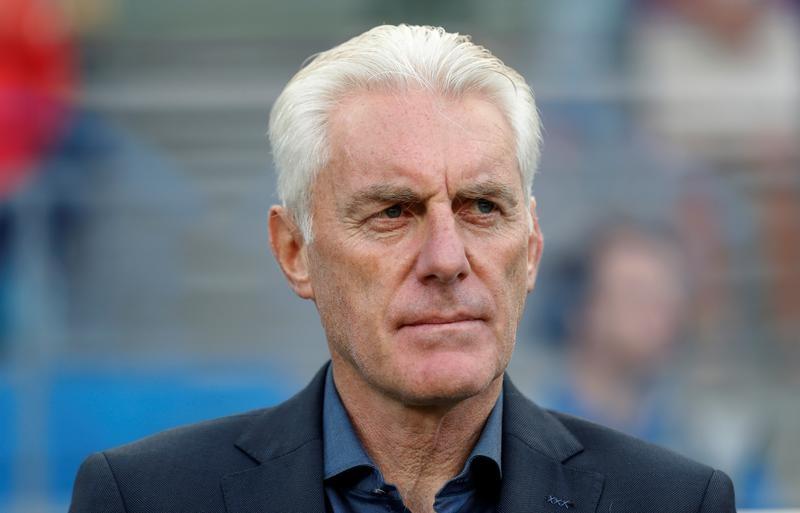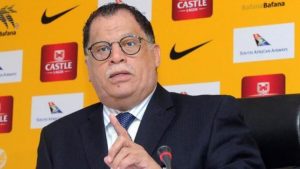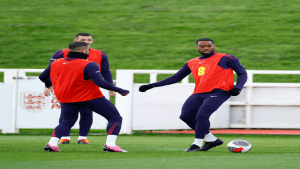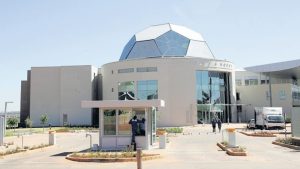Unbruised and clear in his thought, the first thing Hugo Broos needs to know is that he has just walked into a lion’s den. In a lion’s den, you kill or you get killed. If you walk out alive, even if you are bruised, Hugo, you will be boss! He can either kill like Clive Barker once did, or he can get killed like Shakes Mashaba and many others.
Wait, there’s another option. He can still escape like Carlos Alberto-Parreira, but if he does, he mustn’t send us his cousin.
He comes from Belgium, where since 1904 the country’s national team has had 24 coaches. That is 24 coaches in 117 years. Here, he is the 24th coach and that is in 29 years. So, go figure. Eat or be eaten! By the way, that was still the first thing.
The second thing he needs to know is about the second coming of the messiah … no, let’s just say the coming of the messiah. Broos needs to know he is coming into a country in which for decades, the football association has had a lackluster attitude towards football development, without proper preparations and a lack of long-term vision and continuity. SAFA has always sought the messiah – not even the second coming, but the first – whom they hoped would come and work magic. To this day, the messiah hasn’t come, which explains why we have had, in 29 years, an equal number of coaches you have had in Belgium in 117 years. The association is searching for the messiah and right now, they hope Broos is the one who will walk on water and turn water in wine.
However, Broos, hopefully, would know that football, especially on the international stage, does not work like that. Winning championships is a mere reflection of the quality of the preparation towards that event. Without vision, proper preparation and continuity, you are as good as absent.
Every coach that eventually walked away from this team bruised and battered, could be defended that it really didn’t matter who coached this team – whether it was World Cup-winning Parreira or a chancer like Phillipe Trousier – the team lacked the quality to take on the world.
But Broos does not have that luxury. If he fails, it’s on him.
Whether by chance or design, the 69-year-old, the oldest ever Bafana Bafana coach, comes in under completely different circumstances. If we talk about laying the foundation, the foundation is there for a decent team to qualify for events like the Africa Cup of Nations and the FIFA World Cup and actually go on to do well.
Now, to help Broos a little, perhaps it is best, at this point, to recap his own nation’s resurgence. Since the notable performance by Belgium, finishing fourth at the 1986 FIFA World Cup, the Red Devils failed to repeat that feat for years to come. This culminated in their failure to even qualify for the 2006 Fifa World Cup in Germany.
Four years prior, Belgium had already embarked on a plan to rebuild the team.
In 2008, Belgium started reaping the benefits of their investment when the golden generation began to emerge at the Olympics in Beijing. But because rebuilding is a process, the team still failed to qualify for the 2010 Fifa World Cup in South Africa.
However, the team was back at the World Cup in 2014 in Brazil after 12 years under Marc Wilmots and went on to reach the quarterfinals of the tournament, winning all their group stage matches against Algeria, Russia and South Korea.
Four years later, in Russia, the team went on to surpass their 1986 fourth-place finish, by finishing third.
While coach Roberto Martínez should also be credited with this achievement, it would not have happened without the long-term vision and the years of proper preparations leading up to the 2008 Olympics.
Eight players from the 2008 Olympics team, including the likes of Vincent Kompany, Thomas Vermaelen, Jan Vertonghen, Mousa Dembélé, and Marouane Fellaini were in the team that reached the quarterfinals in Brazil, six years after the Beijing trip.
Fifteen players from the Brazil tournament, with names like Kevin De Bruyne, Romelu Lukaku, Eden Hazard, with the experience of five players from the 2008 Olympics were part of the squad that gave Belgium’s best-ever World Cup performance in Russia.
Vision, preparation, continuity, vision, preparation, continuity.
When Wilmot took over as Belgium coach in 2012, he had been an assistant coach to Georges Leekens since 2009, helping him to continue with the foundation laid ahead of time.
The following is key:
In an interview with the Daily Mail’s Stephen McGowan, Belgian’s Football Manager, Michel Sablon, said, ‘‘We made a brochure. It was more of a book, in fact. We had a whole group of people around a table in the technical department and we decided to make a plan for three target groups. First of all was the clubs, secondly the national team and third the coaches of the schools. So, we adopted the same vision for all three groups. We went to the clubs and asked them to play a certain way below under-18 levels. We asked them to play 4-3-3 with wingers and three midfielders and a flat back four. In the old days, it was always a flat back three, so this was brand new to them. It took more than five or six years before everyone could bring themselves to accept it.”
Vision, preparation, continuity, vision, preparation, continuity.
Broos would need to stamp his authority in this regard. SAFA’s top brass dilly-dallied on what his mandate was and if he doesn’t immediately demand the mandate, what the vision is and the plan to achieve those objectives, he is doomed for failure like all the others that came before him.
Whether by design or accident, Broos might be the most fortunate coach to take over the South African national team. This, to some extent, under similar circumstances his own country found itself in at some point and depending on how he, together with the local football community, builds on this foundation there is the potential to restore some pride in the national team.
Broos comes in at a time when the U23 are preparing to travel to the Tokyo Olympics in Japan. Never has in the history of this football there been a team that goes through all the important junior international competitions. This group of players has been to the 2015 U17 Fifa World Cup in Chile; the 2019 U20 Fifa World Cup in Poland and are now getting ready for the Olympics. If you think they are not prepared for the big stage, having amassed no less than 39 international competitions games, some of these youngsters have been exposed to international competitions more than some of the players in the senior national team and have already played against some of the stars that will emerge in Qatar 2022.
The majority of these players are already getting game time in the local games and some are exposed to higher competitive matches playing abroad. This is very important, as Broos’ countryman, Eden Hazard, in an article titled Why Belgium has the most exciting footballers in the world, was quoted in 2013 as saying, “When we do get together, it is important we have all been immersed in the same football culture. In England, it is one country and pretty much one style of football, very intense, generally high-tempo, so we do share that. There are others who come in from [Spain’s] La Liga or elsewhere, really good players who bring different things, but the players in England do share something I think.”
Unlike, Michel Sablon’s plan to revamp Belgium’s football altogether where they immersed the country in one football culture, South Africa didn’t have that. This is not for lack of a football philosophy. The philosophy is there and it is well defined, but it is the implementation of that philosophy that has always been the biggest shortcoming. South Africa is characterised by a myriad of football cultures and the toothless South African Football Association’s Technical Committee has failed to take the lead in this instance.
But what is SA’s football philosophy?
Former University of Pretoria FC Head Coach, Zipho Dlangalala, who was also in charge of the Als Puk Tawana, says, “For me, the SA Football Philosophy is based on three legs – technique, mobility and creativity. It is evidenced by short pass combinations, continuous movement – physical and psychological and a lot of improvisation. Players are always looking for new ways to express themselves in the game. It is very offensive, in nature. Defending is a ‘default’ moment. You can go on and on – self-expression, exuberance, team cohesion, individual arrogance, technical, fun, carnival, intriguing, etc.”
According to, football Development Coach Omar Davids, “There exist unique traits of creativity and improvisation associated with disguise and tactical surprise. Players are able to function in a diversified range of positions due to their mobility and capacity to understand different roles and positions,” Davids explains. “The physical capacities of reaction speed, explosiveness, speed and endurance allows for distinction somatic factors (specifically built of footballers) to complement our play dynamics. Our players have inherited a strong dedication to the sport despite the adversities of oppression and marginalization. Our players are resilient, creative and artistic by nature. Most if not all of these characteristics have been exhibited by the greats in world football; Maradona, Platini, Cruyff, Pele, Puskas, Eusebio, Zidane, Ronaldo, Ronaldinho, Messi, Xavi, Iniesta, Kaka, etc.”
Broos would have to engage the technical committee as a matter of urgency on this note and borrow from Sablon’s plan to rebuild Belgian football and try to apply the plan in the context of South Africa’s specifics.
But most importantly, Broos needs to familiarise himself with the philosophy and premise the style of play for the national team on this football ideology. That is paramount! This involves engaging with the coaches of junior national teams on this and perhaps even co-opting into the senior national team, the U23 technical team led by coach David Notoane. This will go a long way in ensuring there is continuity in from the U17 up until the senior national team in terms of the playing personnel but also the culture. With the second round of the Fifa World Cup qualifiers set to kick off in four months, these engagements will come in handy in making sure there is smooth incorporation of some of the U23 side players into the senior team with some of the already key members of the senior team, to ensure that the team is ready in time for the qualifiers and Qatar.
The nation is hungry for success. The foundation is laid strong. Qualifying for Qatar is, under these circumstances, non-negotiable. If SAFA are not clear on what Broos’ mandate is, the nation’s expectations will serve as the mandate.
Broos would also need to know that South Africans don’t just want to win. South Africans want to win with style and arrogance. They have their own Samba and they call it Diski. If he familiarises himself with this and maximizes on it, there is reason for him not to one day leave this country bruised and battered.
Welcome to the jungle. This is Africa after all.






